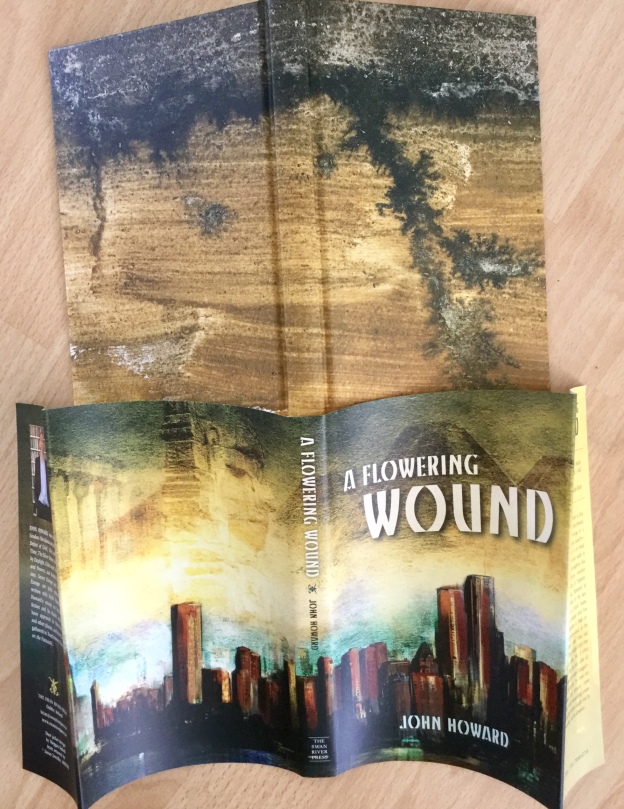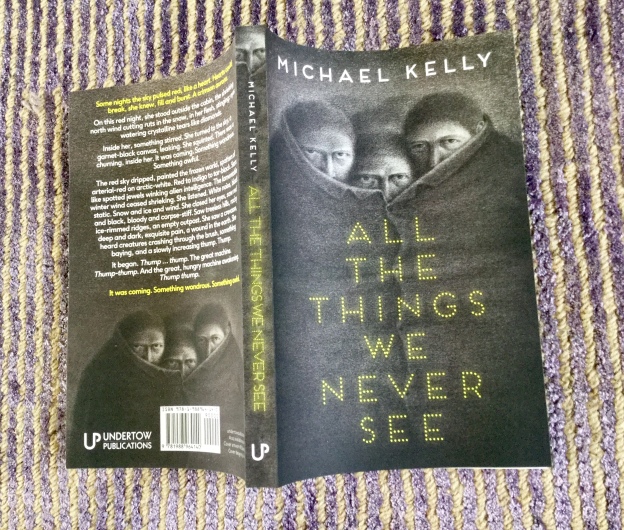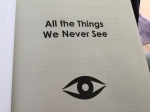A Flowering Wound – John Howard

THE SWAN RIVER PRESS MMXIX
My previous reviews of John Howard: https://dflewisreviews.wordpress.com/john-howard-mark-valentine/ and the Swan River Press here: https://dflewisreviews.wordpress.com/swan-river-press/
When I read this book, my thoughts will appear in the comment stream below…



 ALL THE THINGS WE NEVER SEE
ALL THE THINGS WE NEVER SEE [image by Tony Lovell]
[image by Tony Lovell] 

A Glimpse of the City
“People from the different centuries caught in the photos, whether involuntarily or posing, were swallowed up into human and stone montages that spanned decades and mixed frozen attitudes and expressions…”
As well as this being a discrete fiction – one that I recognise straightaway as an atmospherically ‘weird-glimpse’ haunting of a story, an unquestionably great one, of the type I love – this, for me, is also serendipitously a further cross-section of the history and urbographics of the city of Berlin’s ‘obsessive’ genius loci that I have just finished reading about in the whole of this author’s book ‘The Emperor’s Pavement’.
I am one lucky reader. A maze of emotional linkage.
Portrait in an Unfaded Photograph – John Howard
This is a retro-causality by history, tied up with events in Romania etc. and the power of literature (as ‘magic fiction’?) to make things happen for real. It involves the power of the emotion caused by literature itself and the rivalries or jealousies that it can invoke, bigger even than world events. I enjoyed the connnections – and the inferences allowed slowly, savouringly to egg out in the reader’s mind as ‘rumours and possibilities’. The story reminded me of a Poliakoff TV drama made lexophonic. Unlike with my previous real-time reviews, I suspect – by the book’s already developed osmosis – that I shall need to return to considering earlier stories when reviewing subsequent ones, as, these days, I do personally seem to be dogged by retro-causality (à la Hadron Collider). So I may re-read this excellent one in due course. (21 Dec 09)
THE GOLDEN MILE
“The looming future seemed to be a solid wall instead of an opening door.”
A man’s life walking and working on the Great West Road or Golden Mile to the West of London leading up to the Second World War, its growth of towers and tube stations and factories – a Machen maze of wandering, with sought soaring Blakean visions perhaps, and radio radiating obelisks, finials, Art Deco liner in dry dock.
He is humble, like his hopes and those of his fiancée, a poignant time, a poignant effulgent ‘fragment of life’, also with his father on Wembley stadium visits and its own once envisaged tower.
This text has a “crop of towers.”
His “heading towards a different tower” makes me think of another west London tower in our news today, something that just happened, happened indeed since this story was written, a tower (“new structures of concrete, brick, and glass together with the sweeping thoroughfares and sprawling estates…”) also full of modern humble trusting folk like our humble hero once was, a tower also one whereby the West End was still, but barely, to the east… “…something disastrous might occur at any time.”
And “great forces were preparing to draw a set of heavy curtains across the European – and possibly wider – stage.”
Falling into Stone
“I thought he loved that stone. He shouts each word as he brings the hammer down, smash, crash.”
This is an involving tale of unrequited love, where austerity is both a reason for these characters to become lock-easy outlaws like grown-up kids from a sub-titled film making their jokey or scary marks when rambling uninvited in rich houses – and where austerity is stylish minimalism in architecture, give or take the odd Art Deco balcony, I guess. The story also complements the Bestwick story, quite unintentionally, I assume, with stone and a hammer playing a large part in the metaphor of the credit crunch, crunch being the operative word. Marble, too, as a scryable vision of what pattern a stone may contain as well as the person it becomes … flecks on the surface only give away some of what deep emotions reside below, emotions that eventually go cold as stone itself when envy and a sense of unfairness outweigh one’s human nature. But I’m rambling now…
A truly superb story.
“Our name was my idea.”
Ziegler against the World
“…as the words talked to each other and edited themselves, agreeing and arguing, before making themselves available…”
I felt this story was agreeing and arguing with me as I nodded knowingly at the beginning with those erstwhile Howardian postage stamps appearing amid Weimar inflation… But then it started arguing back at me with fictionatronic absurdities even outdoing those of Rhys Hughes, but the novel that the hero picked up in the Great War trenches was Huysmans’ DOWN THERE; he obsessively translated it from French to German while the inflationary zeros and serrated edges of the stamps filled his dreams with arguing apertures and jagged teeth; his behaviour bemused his wife who in another world would have sent him off to work across London Bridge, no doubt. And I felt like eating the weighty words before my head floated off like the froth on a daydream. Like his wife, I am bemused, yet keen to use the text’s pattern eventually toward the eventual real-time gestalt of this book, just as the blocks of stamps formed such patterns in the story. To reach the core of the book itself DOWN THERE.
A Flowering Wound
“I turn away from the balcony.”
But not before it collapses on me – or under me. This very powerful story is full of meaning for me. But does it mean anything to other people? It reminds me of the classic story, ‘The City In The Rain’, by Mark West that I reviewed here.
This is about the gathering into tribes. We are each in our own tribe. A tribe of people-that-are-us. Even if the tribe-of-people-that-are-us tread cruelly upon the tribe-of-people-that-are-not-us, we can countenance that because we are blinded to those relativities by the ‘golem’ of the tribe to which we belong. This is what I discover from this book’s gestalt so far.
Sometimes we are in a tribe of the aspirationally tribeless. Fascism can potentially bud in each branch of politics, tribeful or tribeless. It takes something akin to complete non-committedness to become unfascist, neither tribeful or tribeless, perhaps. To cease name-calling is the first step, because names as well as words can be interpreted separately from their semantics. It takes fiction to depict the flowering wound of each ‘y*d’ or ‘n*g*er’ or ‘f*s*ist’ gibe or jollity. (27 Sep 10 – another 4 hours later)
A Flowering Wound
“He offers to sew up the tears in my jacket himself;”
An earthquake is a tear, too. So is Religion when it leads to ethnic cleansing. And this earthquake in Romania around the beginning of the Second World War provides the historical backdrop to a relatively short treatment of these matters, when tears cut across other lines that cross between person and person. And tellingly the map itself suffers its macrocosm or frame of borderlands and boundaries to be erased by a microcosm called Man, in parallel to the cracks in buildings now revealing other frames within them, other structures, other Howard leitmotifs of History laid bare in anguish by more than just metaphor.
We, the Rescued
“He had gradually woven them all, his Berlin, into a fabric that he could roll out across the empty spaces that more and more often seemed to be in wait for him when he let down his guard.”
What can I say about another mighty John Howard story? Always a literary landmark. This one has his apotheosisation of Berlin, its past wartime tortured heat-exchange, its division and later healing, a once fractured city that a different writer Elizabeth Bowen created for a different city, i.e. London’s blitz, as a real-time reviewer of it. We almost feel that the author here in the shape of Sean has gone back to become a real-time reviewer of a past Berlin as a palimpsest of the future Berlin when and where as an Englishman forging a new career, his alternating lonelinesses and relationships took and take place.
“Water glinted, flowing rainbows in the sun.”
“That Buxtehude setting was most beautiful. And Johann Sebastian Bach wrote cantatas using it.”
“The intention had been to create the impression of individual buildings casually placed in a garden environment on a human scale.”
The man a head, or the man a heart, the man two lungs, the man other vital organs, separately or in real-time gestalt. The man a man, too, man plus man plus man, with phones and photos and updates, and messages, between them, amid city’s whistles and drums of the Pride march, not a pride of lions, but perhaps a pride of whoever is important to whom, old friends or not, give or take any age gap as well as texting gap or connection between them. The personal touch of one man upon another man’s neck, and yet another man now missing, despite the available communications in the hand that should make him findable again. A plain whistle might have been easier as one vanishes behind a city corner and another comes into view. Is this a story of the modern frustrations of connection that I just read? I only think so. I knew the names of the central man a man a man he is between, but I never really knew whether they connected. I knew other names, too. But not the names of the women against whom they are squashed up on a seat. How does anyone connect? Easier to get lost these days. The tiny handheld screen itself a flowering wound?
Twilight of the Airships
“…his son spent as much time thinking and gazing up and out into infinity as he did down at his collection of stamps and aviation photographs.”
A very powerful, visionary story, but if I told you exactly why, it would spoil anyone’s first reading of it. It features the Romanian town from the previous story and in the author’s ‘Silver Voices’ (a companion book (?) with a story called ‘Boundaries’ that possibly echoes ‘Borderlands’ above). Reference should also be made to this author’s other books (shown below with links to my reviews) that contain, inter alia, some similar leitmotifs as this story…
…which adumbrates the era’s (1937?) Romanian relationships with Russia and Germany, a story with not a only a genius loci but also a genius immortalis in contiguity with nullity. The shop (the well-characterised father and his son) that sells stamps, banknotes and airship posters. The contiguity of postage stamps along perforated edges, that contiguity of an earlier torn photo and torn geographical/political borders, the currency of leitmotif (part) and gestalt (whole). And the story’s apocalyptic Götterdämmerung portrays the astonishing contiguity of separate and geographically distant historical events…
You will never forget reading this story if you are as lucky a reader as I am to be exposed to these ideas and thus able to draw such mis-contiguities back together again.
The Silver Voices – The Defeat of Grief – Secret Europe – Numbered as Sand or the Stars
“: it was as if I were gazing at a road through a sheet of glass, or looking at a picture.”
Amid today’s oppressive heat wave in my own real-time, the male protagonist, seemingly complete within himself, travelling places in his head as well in his immediate vicinity or real-time of Ealing or Turnham Green, Middlesex, perhaps in more ways than one (all things with which today’s self empathises), and this man is newly divorced, creating a new home on his own, his ex perhaps previously not in tune with his inner travelling. I know other men like that, perhaps women, too. Wandering the streets and this story’s description of the nature of developed London suburbs, like a new Machen. As if accompanied by a Proustian self. It is utterly magical, but I don’t know how, because it is so plainly, if elegantly, adumbrated by the text. His meeting of a man called David… I won’t say any more; the story itself leaves much unsaid, even unhinted. There is certainly some real magic here as I often find with this author’s work – a truly incredible serendipity or synchronicity because half an hour before reading this story I happened to read the first chapter of Lewis Carroll’s ‘Through the Looking-Glass’ and described my experience here before picking up this brand new John Howard story to read! And mimsy are our borogoves. Divided now by our handhelds?
end